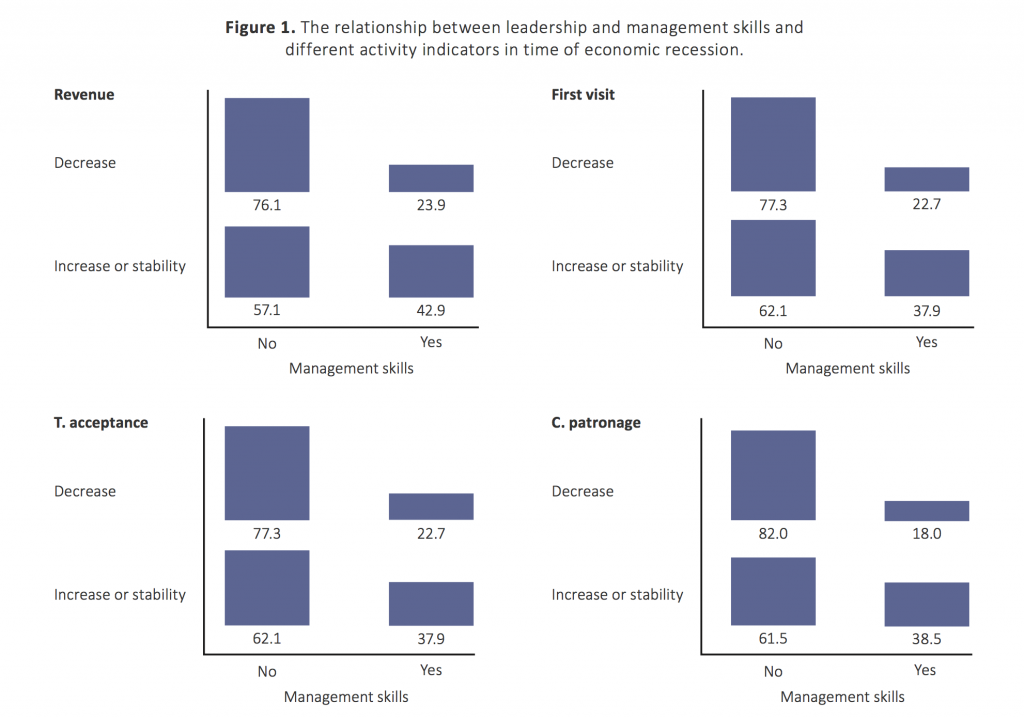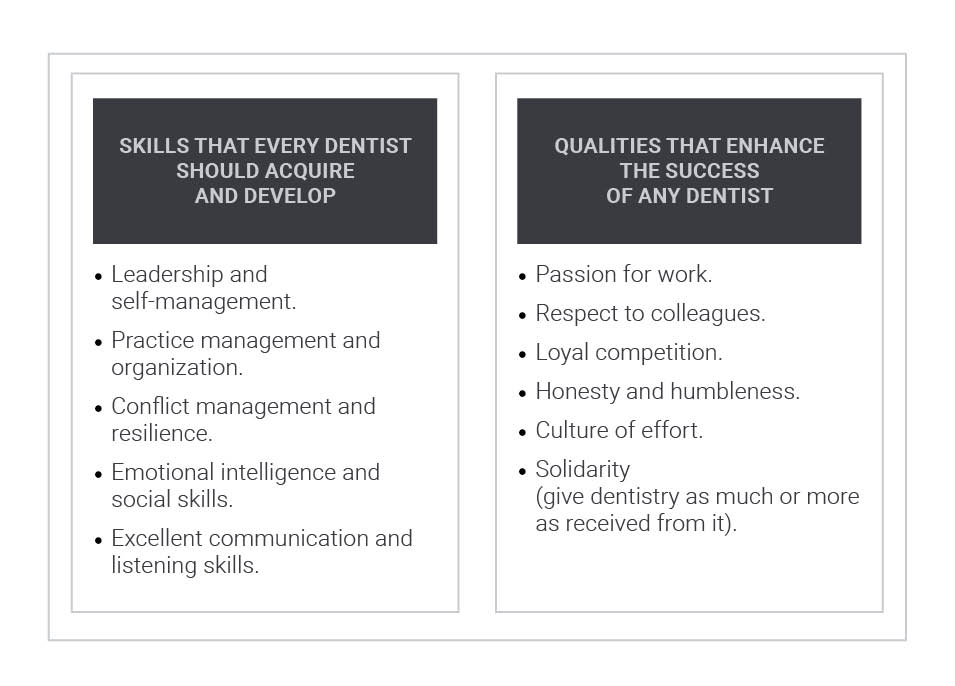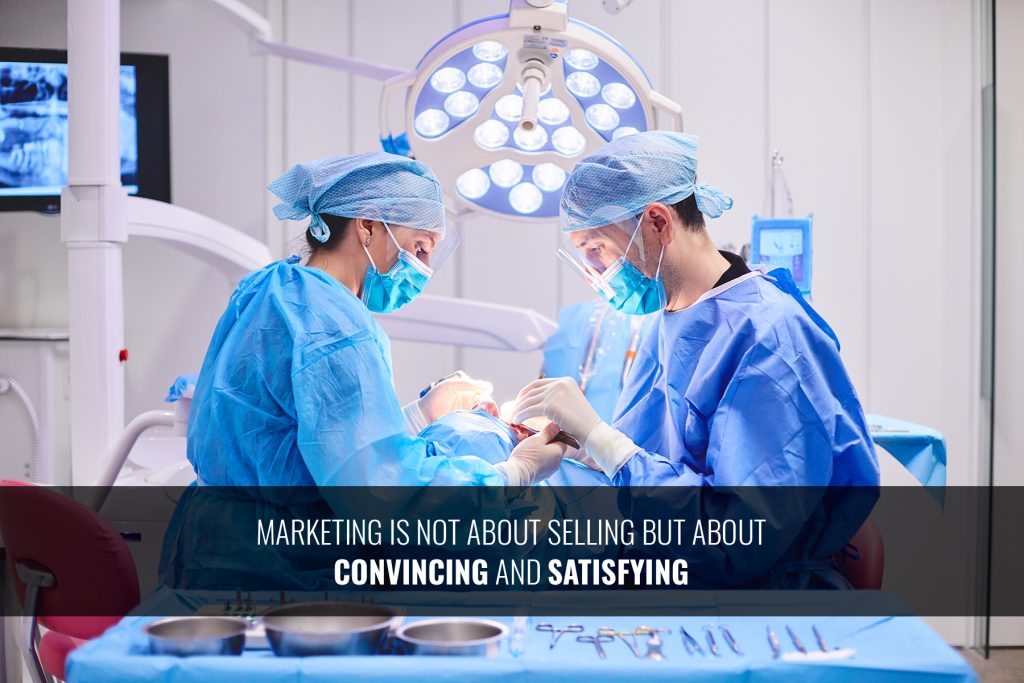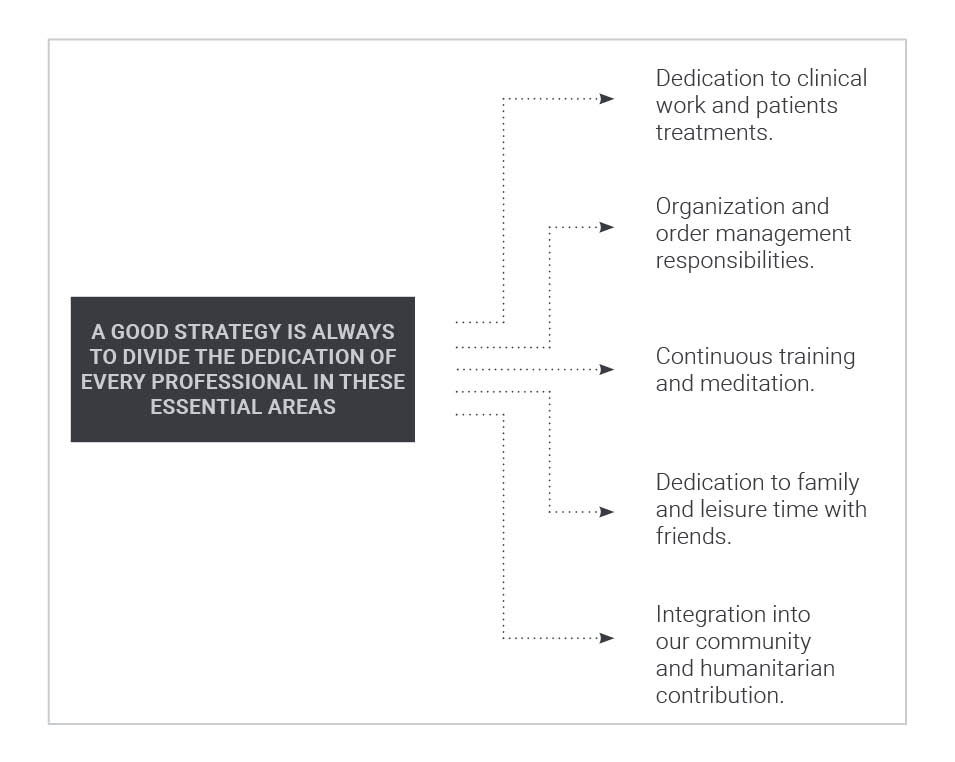10 Frequent Mistakes in Dental Practice Management and How to Avoid Them

Table of Contents
Excellence encompasses much more than what we do within the oral cavity. Clinical practice is not immune to the organization and everything that happens far from the dental chair.
Professional failure often responds to a lack of business planning, the absence of career plans, method errors in decision-making, poor research of the market and its environment, undefined target audiences, lack of systems and protocols, misunderstanding patient needs, use of inadequate strategies, as well as many other factors that are far from our pure clinical nature.
Leadership &Management must be in the dentist's DNA.
Excellence in dentistry cannot leave business management aside. The vast majority of professionals already know the drawbacks of mediocrity and the benefits of excellence. It is time to introduce management in our day to day, whether we have our own dental clinic or not. Change originates in oneself and that is, without a doubt, the first challenge.
Below, you will find 10 false beliefs that I invite you to reconsider and that I hope will help you avoid some of the most frequent errors in practice management. And if it helps you, don't hesitate to read much more in my book Slow & Grow: Keep Calm and Boost Your Success Through Excellence in Dentistry.
1) I am an excellent clinician and that will lead me to success
Today, being a good dentist is not enough to be successful. Being a great dentist and being able to offer quality dentistry is a must. Something more is needed and that is where much more attention should be paid.
It is vital to combine excellence in clinical praxis with a correct management approach.
This strategy will undoubtedly be the beginning of solving the vast majority of challenges that every dentist and the entire professional community faces. There are several studies that show the positive effect of ledership and practice management skills on different aspects of professional activity.

In this figure we see the results of a study comparing the impact of leadership and management on the performance and operation of the dental clinic during the last global economic crisis.
Those professionals trained in clinical management, compared to those without training, saw how during the economic recession their income was affected 52% less, their first visits decreased 55% less and the recurrence in the visit of their patients was also affected a 64% less.
Leading and managing benefits the dental office and the commitment of patients with their dental care visits and check-ups.
2) Practice management is responsibility of my manager and receptionist
A dentist involved in practice management develops greater control over his activity, greater quality over the service provided, avoids waste and manages to optimize their available resources to the maximum.
You are the first link in the professionalization of the management and success of the clinic.
Maybe you are one of those colleagues with the intention of not leaving for a while the dental chair and without motivation to undertake and lead, but to offer your best version you will have to acquire basic skills that allow you to coordinate the work of any professional on your team.
No one likes to take responsibility for something for which they have not been trained. But the truth is practice management can also be exciting for any dentist.

3) What practice management software should I use?
This is possibly one of the first questions that anyone asks himself when thinking about professionalizing his business management.
Many colleagues believe that selecting a software is the first step to control its management.
Having good software is absolutely necessary for management, but it will only be useful when it is applied in a clinic that already has a management method and that has an internal system that the program will serve too and not the other way around.
The software is an essential element, but it is more relevant to have a business and management systems with a well-defined modus operandi and protocols
4) Marketing to sell and get more new patient visits
Marketing has suffered a certain historical rejection by many health professionals.
However, ethical marketing is nothing more than science that should help us establish win-win relationships with patients.
The opposite is not marketing, it is something else.
And this should be the goal in a profession based on long-lasting relationships of trust. Marketing should focus more on caring for our patient portfolio, building loyalty, and making our patients proud spokespersons.
In a recently published study, in which we analyzed the application of loyalty marketing strategies, we could see how word of mouth among patients increased by 24%, the number of first visits grew by 38% and the volume of active patients did so in 87%. (Shadrav A, Kalenderian E, Roig P, 2019).

5) The mission of any business is to make money
The true mission of any company is to satisfy needs in a satisfactory way. The result of meeting patient expectations efficiently will allow us to obtain the necessary benefits to grow and continue investing in improvements.
Making money is not the goal, it is the consequence.
Yet, economic benefits are important as they ensure the viability of the clinic in the long term.
Not surprisingly, not generating benefits can jeopardize the health of our clinic and rebound that of our patients
A dental clinic that is not profitable will be forced to close or reduce its level of competence and quality of service.
6) Taking decisions with my "sixth sense
Success in any oral treatment relies on scientific knowledge and applying precise protocols and measurements.
However, when we talk about business management, there is still a great dependence on intuition or common sense, which, while useful, is far from sufficient.
Decision-making in management implies having data and indicators that allow us to rationally know what is best.

It's not true that dentists don't like numbers. We work with them every day, measuring endodontic files, planning surgeries, calculating interdental spaces, etc. It is also convenient to manage the "maths" of our clinic to lead our destiny with professional criteria.
7) The more patients and appointments… the better
Confusing load work with productivity is one of the most common mistakes.
Multitasking, seeing more patients than possible, chaos or too many improvisations can make us feel very active and give us a false sense of productivity.
Calm, control, focus, order, and good planning are some of the main principles of Slow Dentistry, where it is not important to do more but to do more and better.
No te pierdas este vídeo para saber más del método Slow.
Dentists must strike a balance between clinical dedication and management. The dentist's job goes beyond executing, it takes thinking, planning and directing. I strongly recommend that you use your "thinking chair" more.
8) Me and my tech-toys
Today, even in the midst of the technological era, differentiation is found more than ever in the talent and commitment of the people around us.
Your motivation and progress are essential to improve.
There is no dentist or technology that alone can make a difference.
It is important not to forget how much we need our teams to be unique and establish true teamwork that enriches our work, allows joint professional growth and benefits the patient.
There is no better success than that which is shared from start to finish. A high-performing, winning team is not achieved by chance and requires helpful leadership strategies, teamwork, and motivation.
Some studies have shown the benefits of good cooperation and a good work environment between dentists and teams to improve well-being and professional performance (Rodríguez-Sanchez AM et al, 2013).
9) Competition is my main threat
Nothing threatens more than mediocrity itself or the inability to progress and adapt to circumstances.
Competition, as long as it is fair, helps us to be better and to grow.
The success of others does not have to be our failure, nor our success the failure of others.
Dentistry is a profession of many in which the greatest number of individual successes will affect the progress and reputation of the entire group.
That is why every professional must work to achieve their goals, always remembering that they are part of a professional community in which their contribution of honesty will enhance the prestige of Dentistry, which in turn will thank us for that contribution in the form of more and better patients.
10) Nonstop running
Running with no rest does not guarantee to arrive before, sometimes it does not even guarantee arriving. Not a few of us have or have had the feeling of skidding all day from task to task.
Finding a balance between work and personal life is one of the areas of the greatest complexity but without a doubt the most important.

Our well-being is an essential condition to ensure a professional performance at the highest level and prolonged over time.
It is important to dedicate time to personal care, physical exercise, friends, and to find rest in the things we like the most, like reading, sleeping and all those activities that allow us to present ourselves in our best version.
It takes a much slower approach, inside and outside our job.
CONCLUSION
Today more than ever, leading dentists committed to improving the profession, creating work teams, sharing success and spreading the passion for quality dentistry are needed.
It is not necessary to highlight the terrible consequences of not living up to the circumstances and not meeting the needs of our patients. The best strategy to give our best and satisfy even more patients is to combine excellent clinical skills with excellent management.
Keep slow and boost your practice through excellence in dentistry.
Recommended Book Related with the Topic: Slow & Grow: Keep Calm and Boost Your Success Through Excellence in Dentistry

Comments
0 totalLoading comments...
Previous
How To Use Social Networks To Boost Your Dental Clinic After Covid-19 Crisis. 11 Simple Recommendations.
Next
Periospot´s Bookshelf: April 2020
Related Articles

Machine Learning for Dentists: Predicting Implant Success with AI
1 min read
Osseointegration: The Stuff That Actually Makes Dental Implants Work (And Why You Should Care)
13 min read
